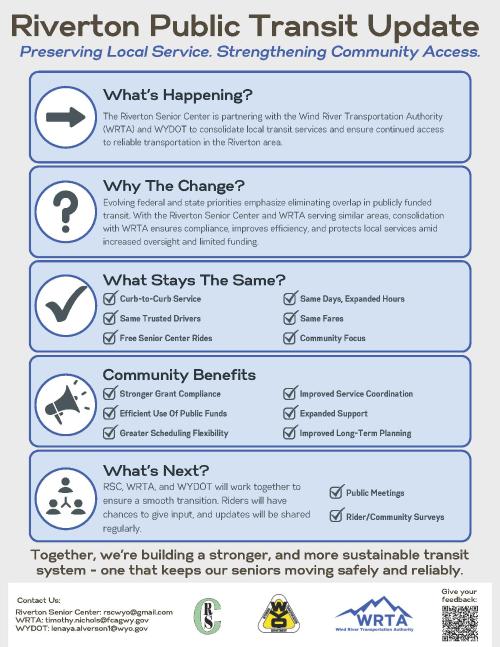- Home
- Administration
- Aeronautics
- Business with WYDOT
- Construction Projects
- Driver License and Records
- Economic Stimulus Projects (ARRA - TIGER)
- Engineering and Technical Programs
- Fuel Tax
- Highway Safety
- Human Resources
- Manuals and Publications
- News and Information
- Permits
- Planning/Projects/Research
- Titles, Plates and Registration
- Travel
- Trucking / Commercial Vehicles
- Vehicle Business Regulation
- Wyoming Highway Patrol
- Search
- Sitemap
Riverton Senior Citizens Center, WRTA and WYDOT to consolidate transit services in Fremont County
June 27, 2025
The Riverton Senior Citizens Center, Wind River Transportation Authority (WRTA), and Wyoming Department of Transportation (WYDOT) are working toward consolidating public transit services in Fremont County.
This strategic move is in response to increasing financial constraints at the state and federal levels. It will help sustain transportation for seniors and underserved populations while addressing duplication and rising costs in a tightening budget climate.
The Riverton Senior Citizens Center has provided door-to-door transportation primarily for older adults and people with disabilities for years, while WRTA has offered fixed-route and demand-response public transit services across Fremont County.
Although both programs are essential, they have gradually expanded to serve many of the same riders and cover overlapping geographic areas. This kind of duplication, where multiple agencies provide similar services without coordination, is inefficient and discouraged under federal transportation funding guidelines.
The three partners are proactively aligning operations to reduce inefficiencies, eliminate overlap and ensure long-term stability.
The consolidation effort includes exploring shared scheduling and dispatch systems, coordinated staffing and training, integrated route planning, and streamlined compliance processes. The goal is to maintain and improve access — especially for residents in isolated areas.
“We know how important reliable transportation is to the seniors and families we serve every day,” said Riverton Senior Citizens Center Director Kimber Tower. “The reality is that running a standalone transit program in today’s funding climate has become increasingly difficult. We’re incredibly grateful to WRTA and WYDOT for stepping up -- not to take anything away, but to help us preserve and strengthen these services for the future. This partnership allows us to focus more on meeting community needs and less on trying to stretch every dollar. Together, we’re building a system that’s more sustainable, more efficient and just as personal and community-centered as it’s always been.”
WRTA Director Tim Nichols said the transition reflects broader trends in public transportation, where agencies are adapting to evolving administrative and funding expectations. “Across the country, transit systems, especially in rural areas, are being encouraged to align services, reduce overlap, and operate more efficiently,” he said. “This partnership represents a pragmatic and forward-thinking approach to ensure long-term sustainability without compromising service quality.”
Nichols said people remain at the center of this effort. “Our foremost priority is, and always will be, the individuals we serve, and the individuals who serve them,” he said. “WRTA is committed to ensuring there is no disruption to Riverton’s curb-to-curb demand response service, no reduction in rider access, and no loss of employment for current transportation staff.”
Nichols said it's important to honor what has long worked in the community. “As part of this transition, WRTA will continue providing free transportation to and from the Riverton Senior Center. This isn’t about replacing a trusted service. It's about protecting it, strengthening it, and delivering it through a more coordinated and resilient model,” he said.
Ultimately, Nichols said, the goal is to maintain a familiar and dependable experience for riders. “Our goal is a seamless transition, so for the public, the only change they’ll notice is the uniform their driver arrives in,” he said.
“WYDOT fully supports the collaborative efforts between Wind River Transportation Authority and the Riverton Senior Center to ensure a smooth and sustainable transition of public transit services,” said WYDOT transit program coordinator Lenaya Alverson of Cheyenne. “This partnership exemplifies the kind of local leadership and cooperation that strengthens transportation access for all Wyoming residents. This strategic transition ensures that federal grant funding is used more effectively. Instead of duplicating efforts, those dollars can now go further, supporting vehicle maintenance, driver training, and service expansion. The result is a more efficient and equitable transit system for all of Fremont County.”
Public engagement will be central to this transition. The partners will host meetings, conduct surveys, and work with community stakeholders to guide the process. By centering community input and protecting service quality, the collaboration reflects a shared commitment to meeting the transportation needs of Fremont County residents—now and in the future.
“Riverton Senior Citizens Center, WRTA and WYDOT are ensuring that essential services remain accessible, resilient and community-driven for years to come,” Alverson said.
More information about this news release is available from WYDOT transit program coordinator Lenaya Alverson at (307) 777-4730.






